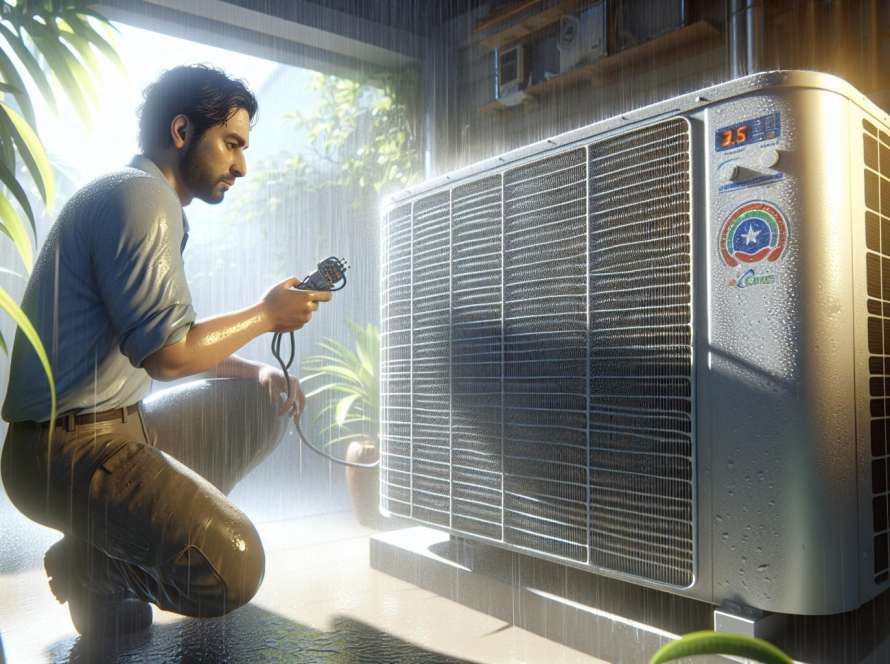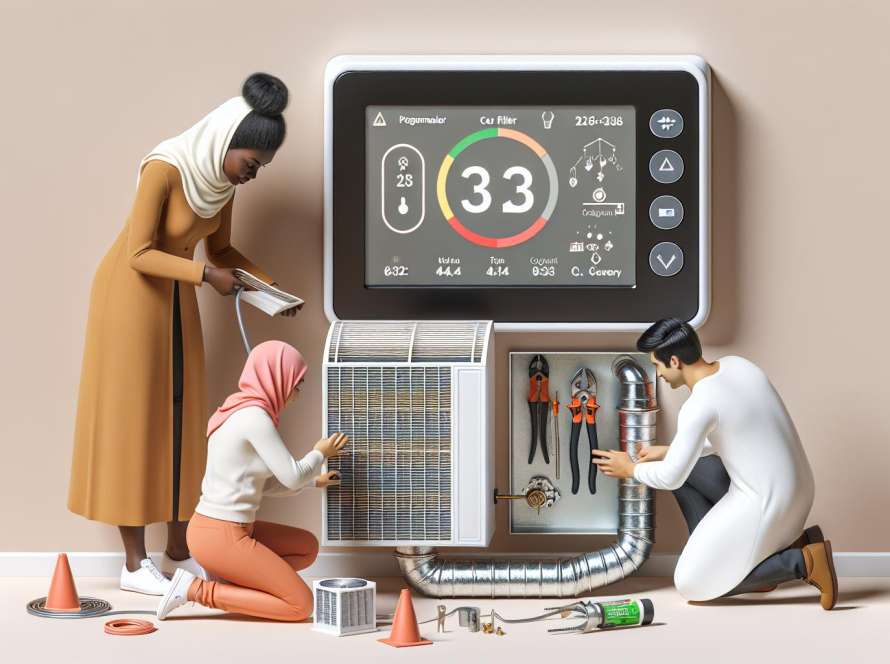When it comes to improving air quality, AC cleaning is a crucial step that often gets overlooked. We all love the comfort and convenience that our air conditioning systems provide, but without regular maintenance, they can become breeding grounds for dust, mold, and other allergens. A clean AC not only ensures better air circulation but also helps in reducing respiratory issues and allergies caused by poor indoor air quality.
At our blog, we understand the importance of a well-maintained AC system in creating a healthy and comfortable living environment. In this article, we’ll delve into the significance of AC cleaning for improving air quality and share expert tips on how to effectively clean your AC unit. Stay tuned as we explore the benefits of regular AC maintenance and how it can contribute to a fresher and healthier indoor atmosphere for you and your loved ones.
Importance of AC Cleaning for Air Quality Improvement
When it comes to air quality improvement, regular AC cleaning plays a crucial role in ensuring a healthy living environment. Neglected air conditioning systems can become breeding grounds for allergens and pollutants, which can have detrimental effects on our respiratory health. By prioritizing AC cleaning, we not only maintain a fresher indoor atmosphere but also reduce the risk of respiratory issues.
For Beginners: Getting Started with Basic AC Cleaning
- Start by turning off the AC and unplugging it for safety.
- Clean the filters regularly to prevent dust buildup.
- Use a soft brush or cloth to clean the exterior of the unit.
- Keep the surrounding area free of debris to maintain airflow.
For Intermediate Level: Enhancing AC Cleaning Practices
- Deep clean the evaporator coil to improve cooling efficiency.
- Check and clean the condensate drain to prevent clogs and mold growth.
- Consider hiring a professional for a thorough inspection and cleaning.
- Invest in UV air purifiers to eliminate bacteria and viruses.
- Regularly inspect ductwork for leaks and mold buildup.
- Opt for HEPA filters for superior air filtration.
- Explore smart thermostats to optimize energy usage and air quality.
By following these progressive steps, we can ensure that our AC systems not only keep us cool but also contribute to a healthier indoor environment. Our commitment to regular maintenance and effective cleaning will result in improved air quality and a refreshing atmosphere for us to enjoy.
Common Allergens Found in Dirty AC Systems

When it comes to common allergens lingering in a neglected air conditioning system, it’s crucial to understand the potential threats to your indoor air quality. Here’s a breakdown for beginners, intermediate users, and experts on the various allergens that can accumulate in dirty AC systems:
For Beginners: Identifying Basic Allergens
- Dust: Accumulates in filters, ducts, and vents, circulating allergens around your home.
- Pollen: Enters through outdoor intake vents, triggering allergies and respiratory issues.
- Pet Dander: Pet hair and dander get circulated through the air, causing allergic reactions.
For Intermediate Users: Recognizing Advanced Allergens
- Mold: Thrives in damp, dark environments like AC drip pans or ducts, posing serious health risks.
- Bacteria: Develops in moisture-prone areas of the AC system, leading to respiratory issues.
- Fungi: Grows in humid conditions, such as coils or ductwork, impacting air quality.
- Viruses: Can spread through the air if the AC system is contaminated, affecting overall health.
- Mites: Flourish in dust and debris, aggravating allergies and causing skin irritations.
- VOCs: Volatile Organic Compounds from cleaning products can accumulate, impacting respiratory health.
As you dive deeper into understanding the range of allergens in dirty AC systems, taking proactive steps to clean and maintain your system becomes essential for ensuring a healthier and more comfortable indoor environment.
Benefits of Regular AC Maintenance
Regular air conditioner (AC) maintenance is crucial for maintaining a healthy indoor environment. Whether you’re a beginner or an expert, here are some key benefits to keep in mind:
For Beginners: Getting Started on the Right Foot
- Improved Air Quality: Regular maintenance helps reduce allergens like dust, pollen, and pet dander, creating a cleaner indoor atmosphere.
- Enhanced Efficiency: Proper upkeep ensures your AC operates efficiently, saving energy and lowering utility costs.
- Extended Lifespan: By scheduling routine maintenance, you prevent costly repairs and prolong the lifespan of your system.
For Intermediate Users: Taking It Up a Notch
- Preventing Breakdowns: Regular maintenance identifies potential issues early, preventing unexpected breakdowns.
- Optimizing Performance: Cleaning and fine-tuning components ensures optimal performance and consistent cooling throughout your space.
- Energy Savings: A well-maintained AC unit consumes less energy, leading to lower monthly bills and reduced environmental impact.
- Advanced Cleaning Techniques: Experts can explore specialized cleaning methods to remove stubborn allergens and residues.
- Professional Inspection: Invest in annual inspections conducted by experts to detect and address any underlying issues proactively.
- Smart Technology Integration: Consider incorporating smart thermostats and energy-efficient upgrades to further enhance your AC system.
Regular maintenance is the cornerstone of a healthy and efficient AC system. By prioritizing maintenance tasks at different proficiency levels, we can ensure optimal air quality, performance, and longevity of our AC units.
Expert Tips for Effective AC Cleaning
For Beginners: Mastering the Basics
- Start by turning off the power to your AC unit before cleaning to avoid accidents.
- Clean or replace filters regularly to improve air quality and enhance efficiency.
- Remove debris around the outdoor unit and ensure good airflow for optimal performance.
For Intermediate Users: Enhancing Your Cleaning Routine
- Inspect ductwork for leaks or blockages to prevent breakdowns and maintain efficiency.
- Clean evaporator and condenser coils to save energy and optimize AC performance.
- Check refrigerant levels and ensure they are within recommended ranges for effective cooling.
- Consider investing in professional HVAC inspections for thorough assessment and cleaning.
- Implement smart technology integration for remote monitoring and control of your AC system.
- Explore advanced cleaning techniques such as rotor brushing for in-depth maintenance.
| Fact | Data |
|---|---|
| Average Filter Lifespan | 1-3 months |
| Recommended Refrigerant Levels | 10-12 degrees Fahrenheit |
| Benefits of Smart Technology | Remote access, Energy savings |
Conclusion
Ensuring clean air quality through regular AC maintenance is crucial for optimal performance and indoor comfort. By following expert tips tailored to different proficiency levels, we can enhance our AC cleaning routines effectively. From mastering the basics to exploring advanced cleaning techniques, there are various strategies to keep our AC systems running efficiently. Investing in professional HVAC inspections and leveraging smart technology for remote monitoring can further elevate our maintenance practices. By staying proactive and informed about filter lifespan, refrigerant levels, and the benefits of smart technology, we can create a healthier environment for ourselves and our loved ones. Regular AC cleaning is not just a task; it’s a commitment to better air quality and overall well-being.

